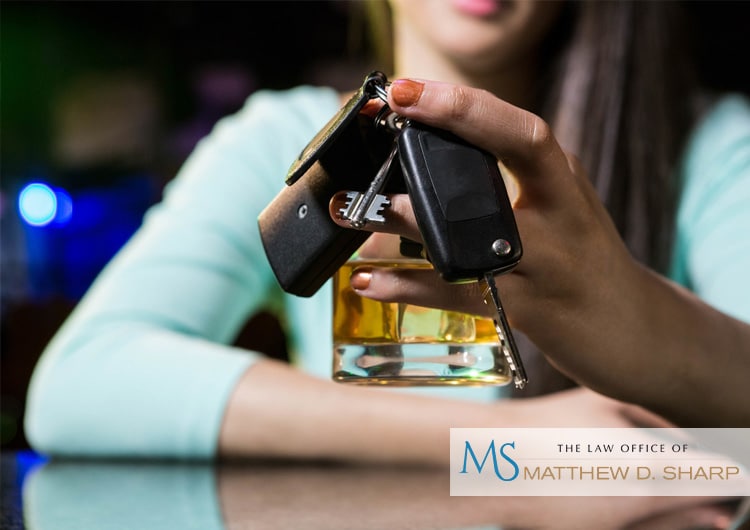Like many other U.S. states, Texas treats drunk driving and driving under the influence (DUI) of marijuana pretty much the same—and penalties can be harsh. In addition to license suspension, fines and mandated community service, receiving a DUI can lead to other consequences like financial hardship and permanent social stigmas that can make pursuing certain careers or finding a job more challenging.
Recently, a study by the National Highway Traffic and Safety Administration (NHTSA) found that drivers who tested positive for marijuana had about the same chance of getting into an accident as sober drivers. Drivers with a blood alcohol concentration (BAC) of 0.05 or higher, on the other hand, were 7 times more likely to get into an accident than drivers who were sober.
So if these statistics are correct and drivers under the influence of marijuana are no more likely than sober drivers to get into an accident, why do most states treat driving under the influence of marijuana and alcohol the same?
We decided to find out what college students had to say about it.
While we could only choose 1 winner for the $1000 scholarship prize—which went to Abigail Britton, a 3rd-year law student at Penn State Dickinson Law—we wanted to highlight some of our favorite responses from other students and share their opinions on this important topic.
Here are some of their answers to the prompt:
Should DUI for marijuana and alcohol be treated the same or different? Explain your legal reasoning.
 |
Abigail Britton, a 3rd-year law student at Penn State Dickinson Law (scholarship winner) “Due to their differing histories, regulations, and harms of usage, driving under the influence (‘DUI’) for marijuana and alcohol should be treated differently. Throughout the United States’ history, marijuana and alcohol have been viewed and treated differently when it comes to their regulation. Alcohol has been widely accepted within our society, based on several socio-ecological factors.[1] Due to its popularity and wide-spread usage, legislatures across the United States have spent decades drafting and amending legislation around its regulation.[2] However, marijuana has been treated as a Schedule I substance under the Controlled Substance Act since the 1970’s.[3] It has only been within the past few decades that marijuana has been legalized within certain states.[4] Its usage is still considered illegal by the federal government.[5] Alcohol and marijuana’s differing history and current legal status in this country require them to be treated differently.” |
Ruben Gonzalez from University of California, Irvine
“Weed’s recent rise in popularity can be attributed to its growing availability, the decrease in stigmatization, and its classification as a herbal remedy. This growth has only raised the amount of questions asked about the many effects weed will now have in a post-decriminalized world. Due to marijuana’s medicinal uses, it would be unreasonable to treat it the same as being intoxicated by alcohol, especially when viewed through the lens of a DUI.”
Sonia Cantillo from Northern Arizona University
“Cannabis affects users differently. While some feel more relaxed and at ease than usual, others feel more anxious and on edge when using cannabis. It could be argued that due to its relaxing effects, those who drive while under the influence of cannabis would be safer and more considerate drivers. It could also be argued that while a relaxed driver is often safer, a driver who is too relaxed can be considered a distracted and impaired driver (similarly to those who fall asleep behind the wheel). While alcohol is seemingly black and white, impaired vs not impaired. Cannabis has a bit more gray area.”
Joshua A Smith from University of California – Davis
“When several states (like California and Colorado) choose to opt out of an outdated law to move forward with the consensus of its people, it is a clear sign to start reflecting on this change across the country. Change is challenging, but so are the sentences handed out to marijuana crimes when its effects are treated socially and legislatively on the same level as alcohol, especially in DUI cases.”
Conor Prendergast from New York Medical College
“Opponents may argue that there is no current standard or rapid-assessment tool for law enforcement to assess an intoxicated drivers’ THC levels. That’s exactly the problem. Given the impairments THC induces, its recent upticks in usage, and it being commonly found in car crash victims, a visibly intoxicated driver is a clear and present danger, that must be taken seriously regardless of the amount of THC in their body.”
Mark W. Seed from Oregon State University
“The state of Oregon already does what is listed above and the legal term of DUI no longer applies. It has been replaced by DUII (as stated, not a typo) which is the acronymized verbatim of ‘Driving under the influence of Intoxicants.’ I believe this was done for two reasons, one being to make the law broader so the state could apply more programs for health and rehabilitation therefore making it easier to recover. And two, because it would be mildly entertaining to watch out of state offenders do mental gymnastics when hearing the arresting officer say a second ‘I.’”
Zeriah Ninchi from College of Southern Nevada
“Drivers make the decision to drive impaired aware of the effects it causes cognitively blatantly ignoring the side effects that could potentially lead to harm to those involved. Driving under the influence of alcohol and marijuana is a choice; a choice that should come with the driver understanding the impact of their choices.”
Alondra Valle from University of Arizona
“I’ve come to the realization that a life is a life, doesn’t matter which substance you were under when it was taken the outcome was the same and the penalties therefore should be equal. Driving drunk or high is very unnecessary and should be frowned upon no matter the circumstance.”
Paige Holmes from Nunez Community College
“There are so many different strains of marijuana that affect people differently the amount of marijuana intake and a person’s tolerance plays a huge factor as well. This is too difficult and time-consuming for an office of the law to determine if one is more impaired than another from the use of this substance when being pulled over. So for the safety of everyone on the road, it’s important to not be under the influence of any substance.”
Hannah Thompson from Oakland Community College
“To clarify, my argument is not that marijuana does not impair performance of drivers; it is that marijuana does not impair drivers to the extent of alcohol and should thereby be punished to a lesser extent. That is, a punishment should be administered for driving impaired regardless of the substance causing the impairment, but the severity of the punishment should directly correlate to the level of risk induced.”
Chase Hayes from California Western School of Law
“In all, the law does not contest the different psychological and physical impairments from the numerous substances. The only elements needed to be classified as an impairment while driving is the presence of impairment, not the substance of which impairment is a result of. In the most simplest of terms, if one were to eat a bag of poppy seeds and become impaired, they then are prohibited from driving under the influence. The law remains blind to the substance and emphasizes the harm that impairment could result in.”
Kemri Curtis from Weber State University
“From an analysis of 60 studies conducted by PubMed Central, it was shown that marijuana causes every performance area that is associated with safe vehicle operation to become impaired. Because of this, it is a reasonable argument that driving while under the influence of marijuana is just as dangerous as driving when over the legal alcohol limit.”
Christina Larson from Eastern WA University
“So what’s the DUI difference? What makes sense? Marijuana is potentially therapeutic, alcohol is not. While marijuana has long been used recreationally there is a strong likelihood that newer individuals are partaking with a beneficial intention and might be unclear how to dose. An alcohol-impaired driver has no reason but irresponsibility whereas marijuana impairment might be health-minded but misguided and a first-time DUI sentence should be weighed as such.”
Donald Vanderholm from Brigham Young University
“If lives are at risk than absolutely marijuana should be treated the same. Along with this, marijuana is considered a gateway drug leading to use of even more dangerous drugs like cocaine and meth. These drugs are highly dangerous and treating DUI’s for marijuana the same as alcohol would hinder the use of these higher drugs.”
Britney Ratliff from Western Michigan Univerity
“I have personally worked as an emergency medical technician for two years and have encountered multiple accidents that were resulting from an impaired driver. I have seen many horrendous accidents from drivers who are drunk, but also from those who were intoxicated from marijuana use. The result was always the same regardless of the substance: someone made a bad decision, and someone ended up getting injured. Whether the driver was using marijuana or alcohol, they were still impaired and not in a sound mind. A DUI is simply driving under the influence and resulting in driver impairment. Using either substance has a higher probability of accident or injury to the user or others and should be treated similarly in the eyes of the law.”
Bonnie Crockett from Arizona State University
“A DUI for marijuana should be treated the same as alcohol to help with deterrence of the event. One of the reasons for criminal punishment is deterrence so if we don’t want people doing it then there has to be a consequence. By having monetary fines, criminal charges, and revoking driver’s licenses, the kinds of consequences already used for drunk driving, users of marijuana would be less likely to over use it before driving because they don’t want to be caught and face those kinds of punishments.
Overall, overuse of both marijuana and alcohol in drivers causes a lot of the same problems so why wouldn’t the punishments be the same?”
Grace Dunnehoff from UDC Law
“Details matter in law. Legislatures need to create new DUI laws for the use of marijuana and not the way that New York did. While driving under the influence is unsafe, the law should not punish equally for different crimes. I consider driving with a .6% increased risk versus a 7.6% increased risk to be very different crimes. Much like the law considers the difference between a knife and a gun.”
Conner Smith from Texas Tech University
“The real question isn’t if the drugs affect the body, of course they do. The hot-button question is should they be treated the same. Absolutely the two should be treated similarly. What it boils down to is the decisions that the user has made up to the point of being pulled over, passing out, or perhaps being arrested for their level of inebriation. When drugs of any kind impair decision-making skills, hand-eye coordination, or affect the ability to make sound decisions, the user has made the choice to consume either of these substances and should be prepared to face the consequences of their actions. Both drugs have the potential to be life-changing decisions that affect more than just the user, but the lives of many people that happened to be caught up in the wrong place at the wrong time.”
Will Morlock from The University of Alabama
“The ultimate goal of federal and state laws against driving while intoxicated are to protect people and make roadways safer. Many people contest that since alcohol and marijuana have different affects on the body, there should be different penalties for the usage of each while operating a vehicle. The arguments behind this logic are misguided. The extent to which a driver is impaired should not determine the penalty when public safety is at stake. Any impairment that may potentially affect a person’s ability to make sound judgements and react to changing circumstances poses a threat for all people on a roadway.”
Megan Dosouto from Roger Williams University School of Law
“While DUIs for marijuana and alcohol use have similar punishments, marijuana DUI punishment should be more severe than alcohol DUI punishments due to the illegality of marijuana on the federal level. Since marijuana is illegal federally, regardless of state legality, the punishment for driving while under the influence should reflect both possession and DUI punishments. This punishment holds the individual accountable for being under the influence and illegally using drugs.”
Think you could write a winning essay? Join us for our next essay contest!
Thanks to everyone who participated in this essay contest! If you missed this contest or weren’t chosen as the winner, we invite you to visit our scholarship page to participate in our next contest. Students must be actively enrolled in college and have a valid student ID number to be eligible. Good luck!





